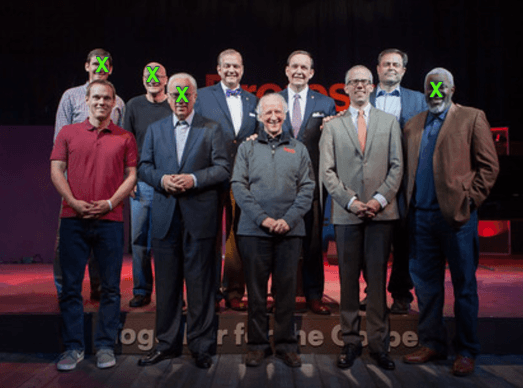Breaking up Is Hard to Do? Notable Absences at Next Year’s Together for the Gospel
By Steven Allen Adams
Next year’s roster does include mainstays like author John Piper; T4G co-founders Mark Dever, Ligon Duncan and Albert Mohler, and David Platt, former president of the Southern Baptist Convention’s International Mission Board. But conspicuously missing are past speakers such as Thabiti Anyabwile, Matt Chandler and John MacArthur, all names that recently appeared in media coverage of controversies regarding sexual abuse, the Social Gospel and a social science concept known as Critical Race Theory. Chandler, pastor of The Village Church in Flower Mound, Texas, got caught up in the abuse spotlight this summer doing damage control after a New York Times story portrayed him as botching revelations that a former staff member had allegedly sexually violated an 11-year-old girl at a church camp in 2012. A lawsuit filed in July seeks $1 million in damages from The Village Church to compensate for negligence, vicarious liability and intentional infliction of emotional distress. MacArthur, president of The Master’s College and Seminary and a speaker at five of the six previous T4G gatherings, feuded publicly in May with Mohler, president of Southern Baptist Theological Seminary, over a statement by MacArthur and other Christian leaders against using the Bible to justify positions on various issues lumped together under the rubric of “social justice.” The 2018 Statement on Social Justice & the Gospel, not signed by Mohler, denied, among other things, “that the postmodern ideologies derived from intersectionality, radical feminism, and critical race theory are consistent with biblical teaching.” One of the signers, Florida pastor Tom Ascol, executive director of Founders Ministries, objected strongly at this summer’s SBC annual meeting to the hasty passage of a resolution defending the use of critical race theory and intersectionality “as analytical tools subordinate to Scripture” in recognizing distinctions related to ethnicity, gender and culture. Ascol, an author for Dever’s 9Marks church resources venture, recently made waves with a 4-minute trailer for a planned documentary film about “unbiblical agendas” being advanced in the name of social justice “under the guise of honoring and protecting women, promoting racial reconciliation, and showing love and compassion to people experiencing sexual dysphoria.” Dever, senior pastor of Capitol Hill Baptist Church in Washington, D.C., reportedly asked that his interview not be used in the film. Mohler said on Twitter he was “alarmed at how some respected SBC leaders are represented” in the trailer and that “Southern Baptists expect and deserve a respectful and honest exchange of ideas.” Three of the six Founders Ministries board members resigned. The movie — titled “By What Standard?” — has raised $46,000 toward a crowdfunding goal of $75,000 and is aiming at a December release. Anyabwile, a pastor at Anacostia River Church in Washington who supports the idea of reparations for slavery, is one of a small number of influential blacks in the SBC downplaying the threat of a so-called “Social Justice Movement.” Also missing from the lineup is worship leader Bob Kauflin, director of Sovereign Grace Music and a pastor at Sovereign Grace Church in Louisville, Kentucky. Kauflin’s church is led by Pastor C.J. Mahaney, one of the four original T4G co-founders who has been long plagued by scandal. Publicity over a dismissed lawsuit accusing Mahaney’s former church in Maryland of covering up numerous abuse allegations forced Mahaney to withdraw from participation at two of the last three T4G gatherings in order to avoid creating a distraction. In 2013 Dever, Duncan and Mohler joined in a full-throated defense of their friend and colleague, withholding judgment about the truthfulness of the allegations against him while vouching for Mahaney’s “personal integrity.” Under mounting pressure from the #MeToo movement protesting the mistreatment of women by powerful men, Mohler apologized in February for “serious errors” in his handling of concerns raised about his former friend and said he and Mahaney are no longer talking. In 2020 Kauflin will be replaced as song leader by Matt Merker, an elder and pastoral assistant at Dever’s Capitol Hill Baptist Church in Washington. Critical Race Theory, a theoretical framework in social sciences originating in law schools in the 1980s, claims that racism is engrained in the fabric and system of the American society. It uses terms like white privilege and institutionalized racism to explain differences in wealth and power. In the context of Critical Race Theory, intersectionality proposes that race alone does not account for inequality, factoring in matters such as sex, class, national origin and sexual orientation that also separate the haves from the have-nots.
|
.
Any original material on these pages is copyright © BishopAccountability.org 2004. Reproduce freely with attribution.
